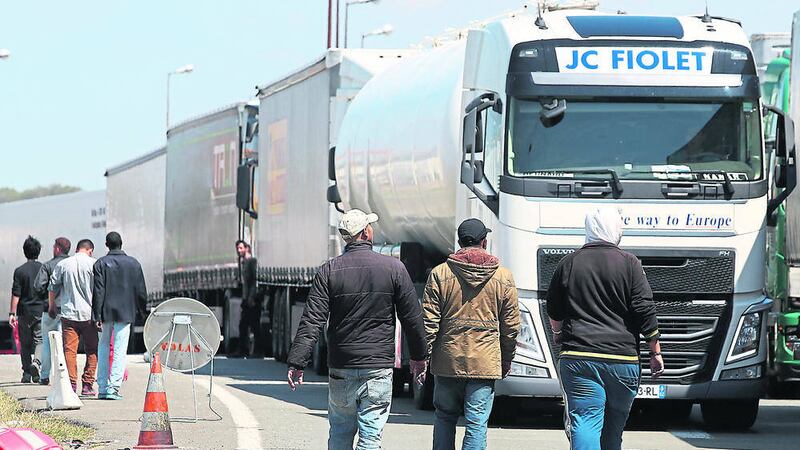Some are calling it the EU's greatest refugee crisis since World War II. And it is, politically - if not yet numerically.
Overloaded dinghies in the Med crammed with thousands of desperate dreams for safety - dreamers already drowning in others' deaths.
Forest villages at Calais formed together by human beings scraping survival with neither homes nor hope.
Border walls being built. Fears being fostered. Fascism being rekindled.
We watch it. We get angry, upset. We write letters, say prayers, press politicians, pledge donations, shed quiet tears.
We criticise the causes - largely the legacy of disastrous colonial campaigns.
We applaud the rescuers - Ireland's naval vessel LE Niamh saved 225 women, children and men on Saturday night.
We challenge the automated security responses - bomb-raids on war-lords and people-smugglers won't feed refugees.
We debate the underlying values of public discourse - they're human beings, not 'swarms'.
After that though - all the emotion, the dinner-table analysis, the three-minute news bulletins - for many of us these issues start to feel a bit too complex, too complicated, too big, too far away. But they're not. They can be tackled.
The irony is that Europe's perceived strengths, in part, increase the humanitarian risks which it's now being forced to address.
Step back for a second.
Internally within Europe we often see our own continent - even our own states - as crisis-ridden, democratically dysfunctional, powerfully unequal, and affected by many unjust social and economic factors. And we're often right.
But externally - for war-wearied people in North Africa and the Middle East - our continent is perceived as a much safer place, where women will have rights protections (at least some); where children might have educational opportunities; where men of fighting age will have survival chances.
Inequalities are therefore relative in global terms.
Like Russian dolls, domestic inequalities across Ireland sit within larger international inequalities that flow from the West's failed global and economic strategies, borne of the 1980s. (And that's notwithstanding the particular legacy of religious and political discrimination in the north.)
Inequality is consistently identified as one of the central causes of instability, and therefore insecurity - economically, socially and politically.
So logic suggests that one way for tackling global instability and insecurity should be proactively tackling global inequalities. This should make global economics and profit-creation more sustainable and stable, and presumably more effective. Shouldn't it?
Instead the opposite usually happens.
Often, piecemeal measures simply tinker around the edges of inequality as a PR branding for global capital streams.
At worst, extreme right-wing neo-liberal agendas take charge and don't even consider cosmetic gestures at closing inequality gaps.
These agendas don't treat the insecurity caused by their inactions as a mistake. Rather they just treat it as a new 'market' - one that can be serviced with even more intensive security 'products'. (Some Western profiteers actually rely on the people-smugglers.)
This is the extremist edge of unsustainable economics built on unacceptable inequalities, unregulated profit and appalling inhumanity.
It's an important part of the jigsaw for what's happening to refugees today, and it cries out for a counter-measure of practical policy remedies.
So look then at sub-Saharan Africa. At present these regions are increasingly being targeted as 'emerging markets' by both the USA and Europe, and by China.
The entire African continent is approximately 400,000 square miles larger than the combined land-mass of China, Europe and the USA, including Alaska. It's immense.
Demographics and technological developments are opening it up as a game-changer global market over the next generation. It's partly why President Obama recently visited East Africa. No longer is it just about diamonds, metals and minerals.
Like it or not, the cultivation of sub-Saharan Africa as a new mass-market by global capital is unstoppable.
The key question then is whether Western and Chinese interests will lazily perpetuate the vicious unregulated cycle of structural inequality and instability - thereby further increasing global insecurity and inhumanity - just for short-term profit.
Or, whether they will at last learn the lesson that gross inequality is counter-productive - on every socio-economic, political and security level.
That's why progressive democratic strategies based on practical policies must constantly be forced centre-stage to promote sustainable economic frameworks.
And those practical policies aren't rocket-science. They include accountable, representative public institutions; women's empowerment programmes; co-operative and collective employee engagement; meaningful and effective community consultation; progressive corporate social responsibility; equality-based contract compliance; strong corporate governance; ethical public investment; fair terms and conditions; just corporation taxation regimes; well managed public ownerships; rights-based education, training and advocacy systems.
Such practical policy measures now need strategically championed throughout the global economy - not least Africa - by today's generation.
If not, the humanitarian refugee nightmare facing tomorrow's generation will simply be unthinkable.
j.kearney@irishnews.com








